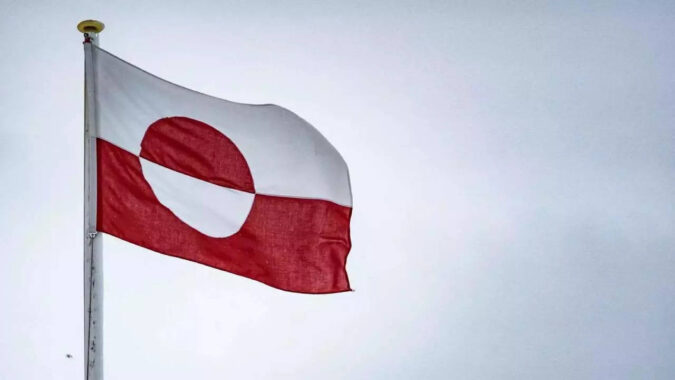COPENHAGEN: Greenland‘s lawmakers on Friday got their first look at a draft constitution which the autonomous territory could rely on if it comes to negotiating independence from Denmark.
Developed in secrecy over four years, the 49-paragraph document written in Greenlandic was presented by a constitutional commission to the territory’s parliament, the Inatsisartut, where it will now be discussed.
The text, still in the draft stage, did not come down firmly on several key issues, local media reported — including Greenlandic passport access and the administration of justice, areas still managed by mainland Denmark.
It also made no reference to the monarchy, leaving unresolved the question of whether the queen or king of Denmark would remain head of state.
“For the time being (the draft constitution) is primarily a Greenlandic issue. It will only concern Denmark when Greenland has discussed it and depending on what the politicians decide,” Ulrik Pram Gad, a researcher at the Danish Institute for International Studies and an expert on Danish-Greenlandic relations told AFP.
Greenland has been autonomous since 1979. The world’s largest island, located in the Arctic some 2,500 kilometres (1,550 miles) from Denmark, has its own flag, language, culture and institutions, but still relies heavily on a Danish grant which makes up a quarter of its GDP and more than half of its public budget.
Mainland Denmark, the Faroe Islands and Greenland — with its roughly 55,000 inhabitants — together form the Kingdom of Denmark.
Since the 2009 Self-Government Act, only currency, the justice system and foreign and security affairs fall under Denmark’s authority.
The Act also included a provision that if Greenland’s people take a decision in favour of independence, negotiations are to commence between Nuuk and Copenhagen.
The resulting agreement, reached with the consent of the Danish and Greenlandic parliaments, would then have to be approved via a referendum in Greenland.
The territory’s geostrategic location and massive mineral reserves have raised international interest in recent years, as evidenced by former US president Donald Trump’s swiftly rebuffed offer to buy it in 2019.
But even though the idea of buying up Greenland has been abandoned, Washington has sought to gain more influence.
Developed in secrecy over four years, the 49-paragraph document written in Greenlandic was presented by a constitutional commission to the territory’s parliament, the Inatsisartut, where it will now be discussed.
The text, still in the draft stage, did not come down firmly on several key issues, local media reported — including Greenlandic passport access and the administration of justice, areas still managed by mainland Denmark.
It also made no reference to the monarchy, leaving unresolved the question of whether the queen or king of Denmark would remain head of state.
“For the time being (the draft constitution) is primarily a Greenlandic issue. It will only concern Denmark when Greenland has discussed it and depending on what the politicians decide,” Ulrik Pram Gad, a researcher at the Danish Institute for International Studies and an expert on Danish-Greenlandic relations told AFP.
Greenland has been autonomous since 1979. The world’s largest island, located in the Arctic some 2,500 kilometres (1,550 miles) from Denmark, has its own flag, language, culture and institutions, but still relies heavily on a Danish grant which makes up a quarter of its GDP and more than half of its public budget.
Mainland Denmark, the Faroe Islands and Greenland — with its roughly 55,000 inhabitants — together form the Kingdom of Denmark.
Since the 2009 Self-Government Act, only currency, the justice system and foreign and security affairs fall under Denmark’s authority.
The Act also included a provision that if Greenland’s people take a decision in favour of independence, negotiations are to commence between Nuuk and Copenhagen.
The resulting agreement, reached with the consent of the Danish and Greenlandic parliaments, would then have to be approved via a referendum in Greenland.
The territory’s geostrategic location and massive mineral reserves have raised international interest in recent years, as evidenced by former US president Donald Trump’s swiftly rebuffed offer to buy it in 2019.
But even though the idea of buying up Greenland has been abandoned, Washington has sought to gain more influence.
